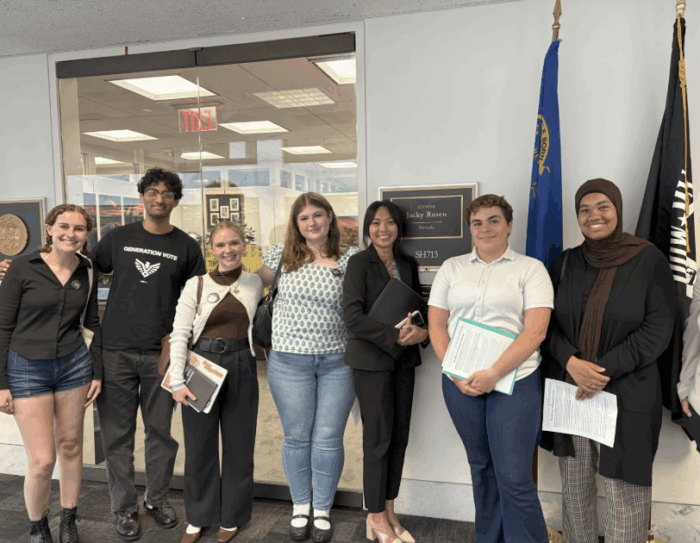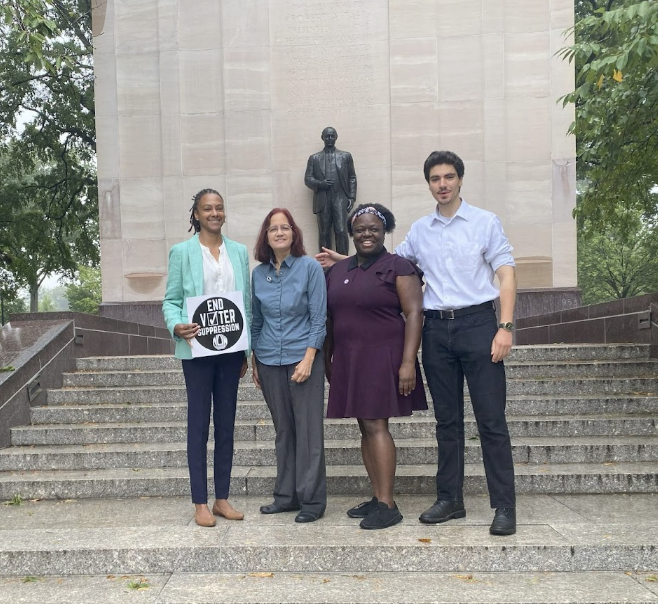On September 10, I joined student activists on Capitol Hill, rallying in opposition to the Safeguarding Voter Eligibility Act (SAVE) Act. This event was part of the ongoing Students for Voting Rights campaign at the Task Force for Democracy, founded and run by Gen-Z activist, Kaden Ouimet.
The SAVE Act, which has already passed the House of Representatives and is now headed to the Senate, is a thinly-veiled attempt at voter suppression. While its provisions requiring proof of citizenship may appear sensible, its ultimate aim is to use anti-immigrant sentiment and election conspiracies to deny voting rights to eligible citizen voters.
Studies show that noncitizens rarely ever vote in federal elections, deterred by the longstanding penalties for voter fraud. According to The New York Times, “noncitizen voting is essentially nonexistent.”
Make no mistake—there is no fact-based rationale for the SAVE Act. It has been marketed as a solution to a problem that does not exist, justified by debunked, racist theories that Democrats are admitting migrants into the country to swing elections.
“The SAVE Act is a full-frontal assault on our right to vote—especially for the working class and communities of color,” Ouimet stated in a release by the Task Force for Democracy.
“Our fight is to not only defend federal voting rights by defeating the SAVE Act,” Ouimet said, “but also expand them by overturning Shelby v. Holder, passing the John Lewis Voting Rights Advancement Act, and adopting state-level voting rights acts (VRAs) in places like Maryland and Colorado.”
During the rally, we were joined by Gen-Z leaders Julia Squitteri (founder of the Ruth Project) and Scout Cardillo (founder of Bulletproof Pride). We were also joined by student members of the National Organization for Women (NOW) and Generation Vote.
Many attendees were also key organizers of D.C. student walkouts last month protesting the militarization of the District.

With its stringent voter ID requirements and mandatory voter-roll purges, the SAVE Act poses a significant threat to student voters like us. It would also disproportionately affect married women, low-income voters, disabled voters, Black and brown voters, victims of natural disasters, and any person who has changed their legal name.
This bill mandates that prospective voters present documented proof of U.S. citizenship, such as a birth certificate or passport, before they could register to vote. More than 21 million voting-age U.S. citizens lack access to the documentation required by the bill.
About 70 million American women currently have their husband’s last name. Prospective voters whose legal name does not match their citizenship documentation will be required to produce name-change documentation when registering to vote or changing their registration. Due to its disproportionate impact on married women, this rule is a feminist issue and a barrier to the full realization of the 19th Amendment.

Perhaps most concerningly, the SAVE Act includes a provision enacting mandatory voter-roll purges, which, while framed as an effort to prevent noncitizens from voting, will likely result in eligible voters being removed from the rolls. I believe this is the SAVE Act’s intention— to strip voting rights away from eligible voters, especially Democratic voters in marginalized groups.
State-level purges, from which the SAVE Act takes its inspiration, have already ended in thousands of U.S. citizens being kicked off the rolls. Eligible citizens currently registered to vote in federal elections may well find themselves disenfranchised if the SAVE Act becomes law.
As part of the voter-roll purge, the bill would also encourage collaboration between state and federal officials to share immigration data. In an age where ICE is acting with impunity to detain immigrants, this data-sharing provision could quickly cause more danger.
In tandem with the SAVE Act, President Trump’s threat to end mail-in voting would devastate the voting rights of students like me, who vote by mail from college to our home states. It would also harm disabled and elderly voters and those who lack access to a nearby polling location.
We, students, must remain vigilant as elected officials work to rig our democracy and take our voting rights. We are especially vulnerable to voting rights attacks, as we rely on mail-in voting and online registration to access the polls while living and studying at our universities.
I was so inspired to see my peers on the Hill, who spoke out against this bill weeks ago. As the SAVE Act sits in the Senate, there is time to stop it. This is our fight.

